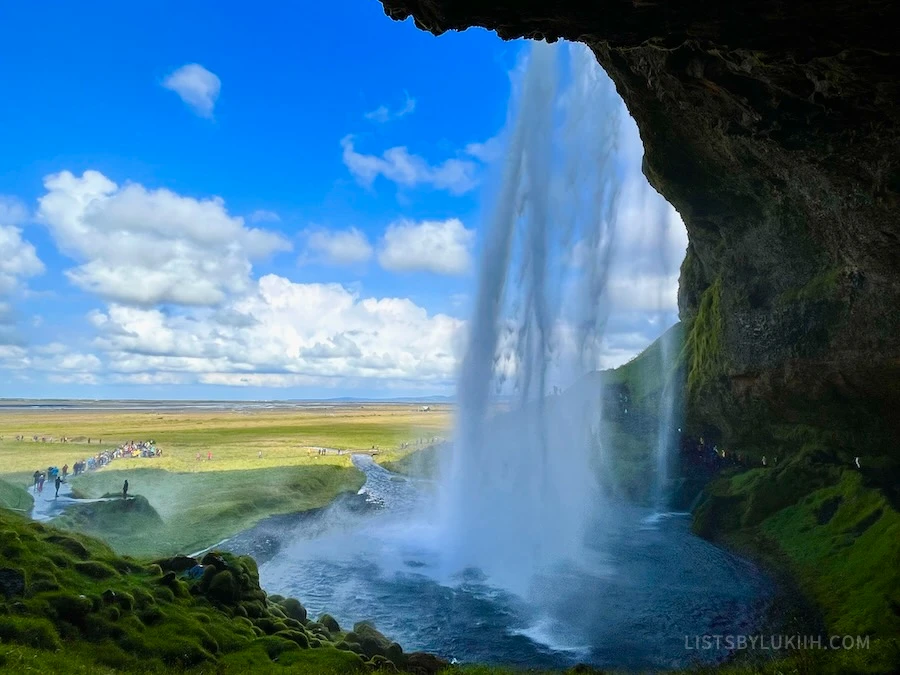Receiving over 2 million tourists last year in 2023, Iceland is a popular country island in Europe that is known for its hot springs, otherworldly landscapes, and waterfalls.
Having spent an epic week in Iceland, I share must-know travel tips that are especially useful for first-time visitors.
Lists By Lukiih is readers-supported. When you buy with my affiliate link, I may earn a small commission. Thanks!
1. Best Places To Visit in Iceland
Iceland is a beautiful country with stunning natural wonders, hot springs, and wild animals (e.g., puffins, Icelandic horses, sheep).
Below are Iceland’s most popular destinations and the top things to see and do in each location.
♨️ Rejkjavík and Blue Lagoon
Rejkjavík and Blue Lagoon are usually visitors’ first or last stops due to their proximity to the Keflavik Airport.
- Reykjavík is Iceland’s biggest city and has a cozy, cosmopolitan atmosphere (here are a few places worth checking out). Almost everyone makes at least a quick stop here.
- Blue Lagoon is an iconic spot and one of the 25 wonders of the world due to its unique milky-blue water. Iceland has many hot springs, but Blue Lagoon is the most famous one.
Make sure to reserve timed tickets in advance for the famous Blue Lagoon as they run out during peak season. See other Blue Lagoon tips.
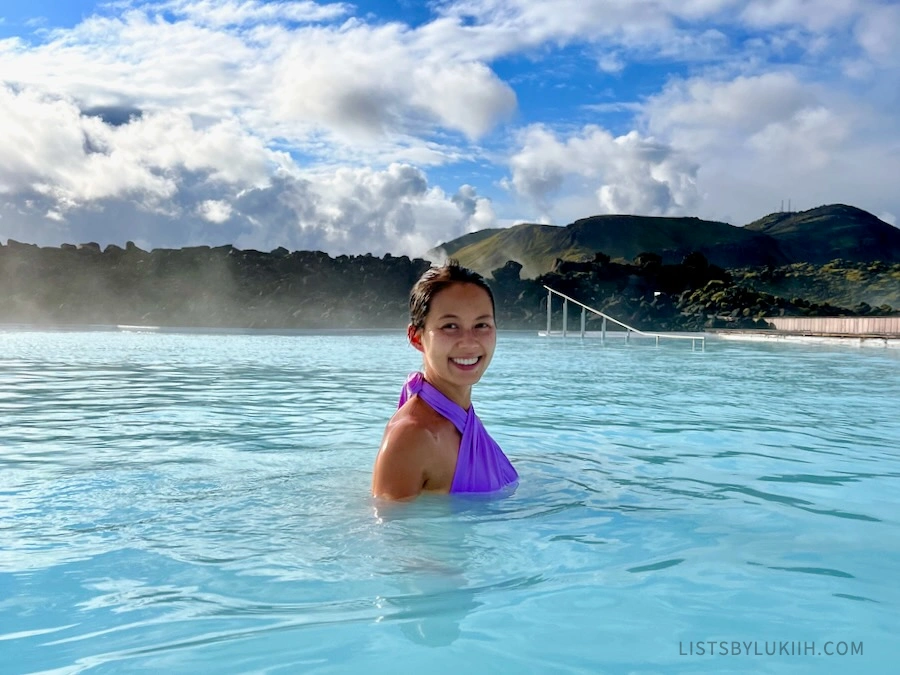
🟡 The Golden Circle
The Golden Circle is a 190-mile tourist route featuring three of Iceland’s main attractions. It’s the most popular route visitors take when visiting Iceland for the first time.
- Gullfoss is one of Iceland’s most celebrated waterfalls known for its power.
- Geysir is a rare, steaming vent that erupts every 5 to 10 minutes.
- Thingvellir National Park is a UNESCO World Heritage Site known for its volcanic landscape.
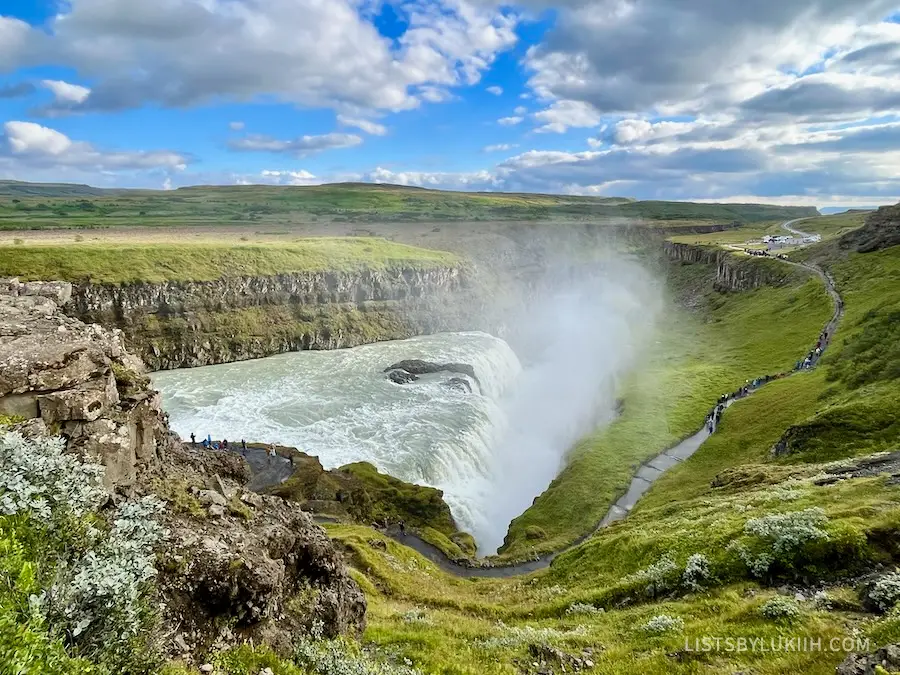
Around the Golden Circle area, you can also snorkel between two tectonic plates in Silfra. The water is extremely clear as it originates from glacier meltwater.
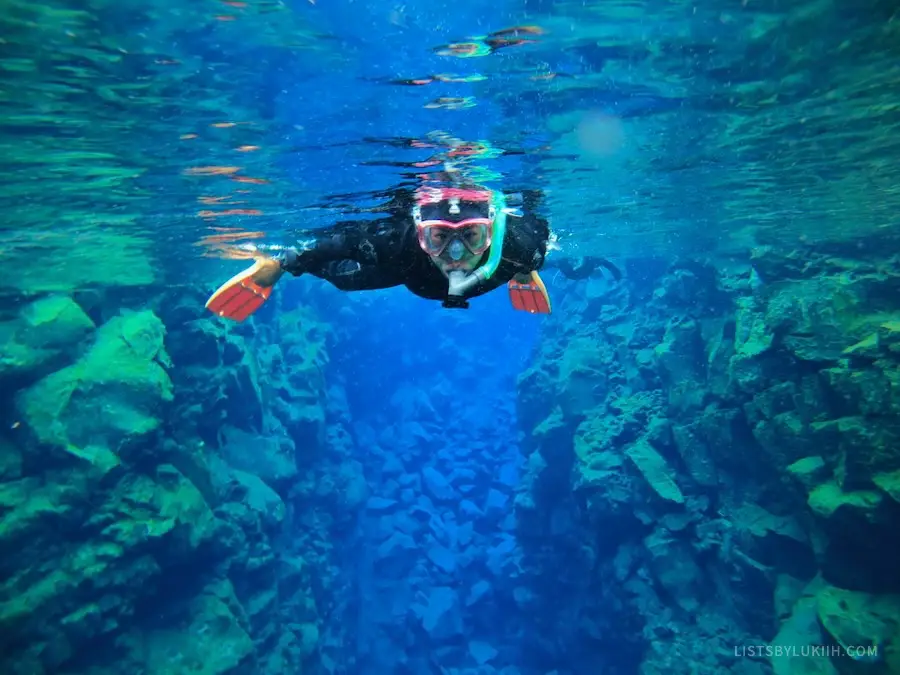
🧊 Iceland’s South Coast
The South Coast is a stretch of land on the southern border of Iceland and is known for its iconic waterfalls, black sand beaches, glacier lagoons, and ice caves. It also has two of the three national parks: Thingvellir and Vatnajökull.
Famous attractions include the powerful Skógafoss, the stunning Jökulsárlón Glacier Lagoon, and the unique Diamond Beach.
Here’s how to do an epic road trip through the South Coast in seven days.
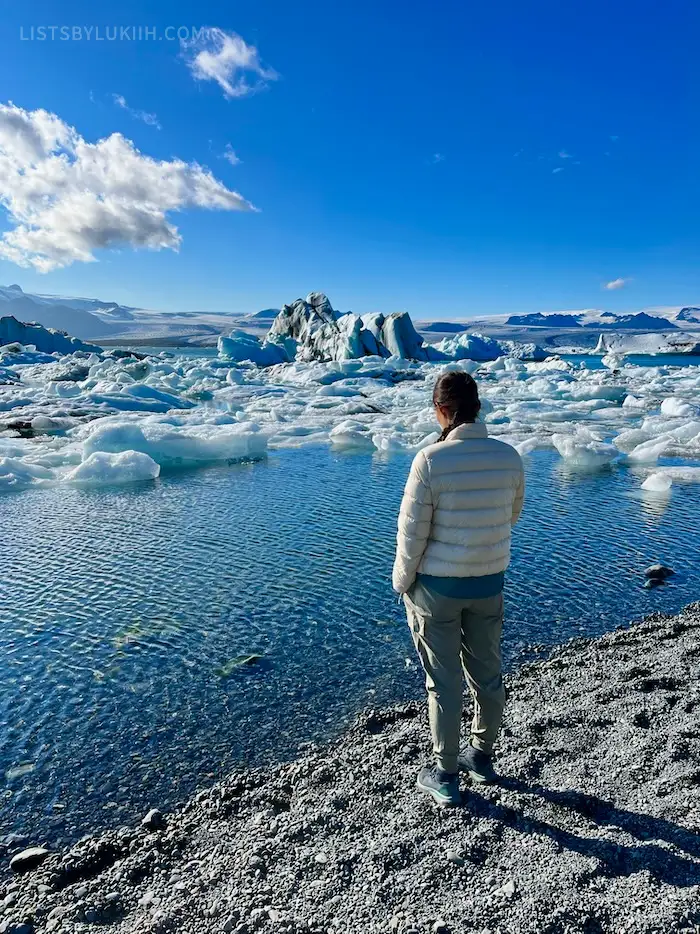
🐋 North Iceland
North Iceland is known for its diverse geological features and remote atmosphere. The town Akureyri is the second largest city and is popular for whale watching.
Iceland is the whale-watching capital of Europe. Since whales don’t appear on command, the best way to increase your chances of seeing one is by going on a whale-watching tour.
⛰️ Snaefellsnes Peninsula
Snaefellsnes peninsula is an area known for its landscape that features dramatic cliffs and fishing villages. This area is often included in visitors’ itineraries if they’re exploring the south and west side of Iceland.
The peninsula’s most iconic attractions are Snæfellsjökull volcano and Kirkjufell mountain.
🚙 The Westfjords
The Westfjords is not typically part of a visitor’s first trip to Iceland due to its location, but it’s a great remote site for anyone who loves rugged landscapes.
This is more of an off-the-beaten-path area for a typical Iceland trip and is a good option for those who genuinely want to “get away.”
🥾 The Highlands
The Highlands is the area in the middle of Iceland that’s largely uninhabited and composed of volcanic deserts. It’s a popular destination for hikers, adventure lovers, and campers.
The Highlands require a 4×4 rental car. If you want to do a day trip instead, hike the breathtaking loop in Landmannalaugar, a unique part of the Highlands.
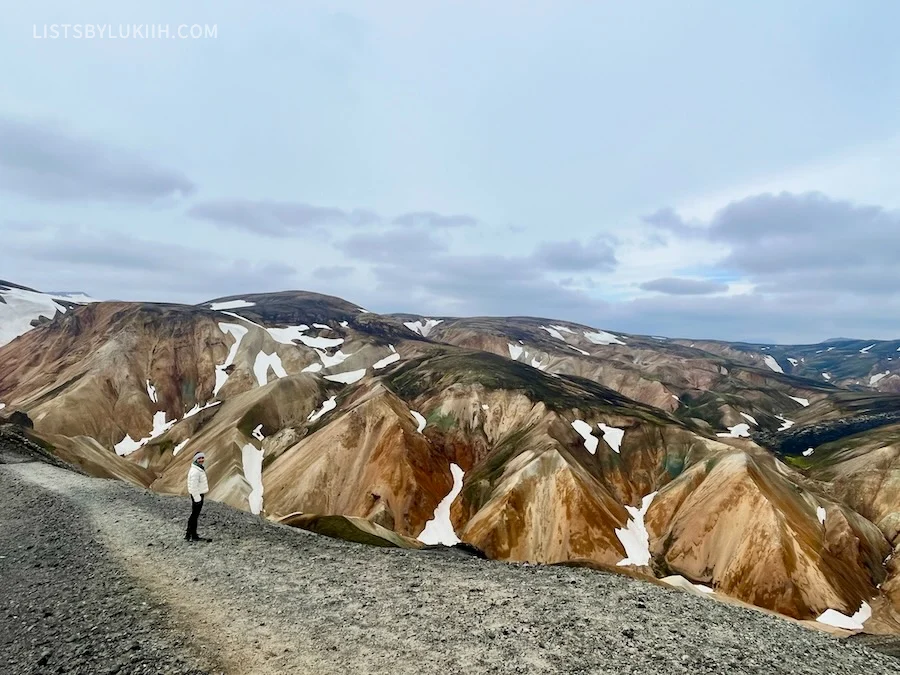
🍀 My Iceland Trip in the South Coast
I spent my entire Iceland trip thoroughly exploring the South Coast. During my road trip, I did three epic hikes and visited several iconic waterfalls, glacier lagoons, black sand beaches, and natural hot springs.
Iceland is breathtaking and one of my all-time favorite trips. I wish I had more time to drive around the more remote areas of Iceland, especially because I visited during the summer when the weather held up.
See the upsides and downsides of visiting Iceland in the summer.
2. How Long To Spend in Iceland
Iceland is a small island country where visitors typically spend seven to ten days traveling.
🗓️ How Many Days Do You Need in Iceland?
First-time visitors should spend at least one week in Iceland to enjoy its breathtaking landscapes and go further out of the capital city.
- With three to five days, you’ll have enough time to visit the capital city, Reykjavík, and the tourist-friendly route known as the Golden Circle. However, you won’t have much time for much else.
- With one week, you can thoroughly travel through Iceland’s popular South Coast.
- With 10 days or more, you can do a road trip along the entire Ring Road, the main road that wraps around the country. This is a popular Iceland itinerary and you’ll need at least 10 days to not feel rushed.
- With two weeks or more, you’ll have plenty of time to see the more remote and off-the-beaten-path areas of Iceland.
🍀 How Long I Stayed in Iceland
I spent seven days in Iceland, but wished I had stayed longer so I could have extra time to see more of the country.
That said, spending a week on just the South Coast gave me more time to explore some of the smaller attractions that aren’t as popular. It’s delightful to be able to visit less crowded natural wonders after seeing so many of the popular hits.
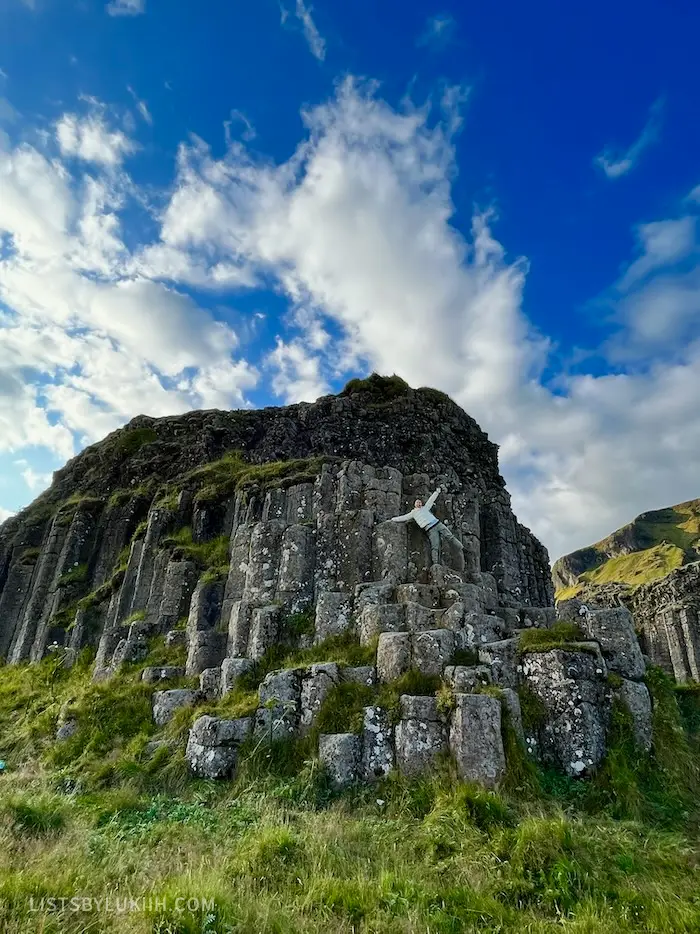
3. When To Visit Iceland
Iceland is primarily a cold-weather country with short daylight times during the winter months. A warm day in Iceland is any temperature above 70 °F.
☀️ Best Time To Visit Iceland
Given Iceland’s cold climate, the best time to visit is during the summer season, which runs from March to May.
During the summer months, you’ll experience warmer weather and long days, as the sun stays out longer. This enables you to do more throughout your trip.
The summer season is Iceland’s high season where every attraction will be crowded. Learn how to prepare for the peak season.
❄️ Iceland’s Seasons
Iceland has four seasons. Here’s a quick overview of Iceland’s different seasons:
| Season | Months | Temperatures | Daylight Hours |
|---|---|---|---|
| ❄️ Spring | Mar-May | 30-50 °F | 12-16 hrs |
| ☀️ Summer | Jun-Aug | 45-60 °F | 15-22 hrs |
| 🌧️ Fall | Sep-Nov | 20-60 °F | 8-14 hrs |
| 🥶 Winter | Dec-Feb | 15-35 °F | 5-8 hrs |
Here are some things to keep in mind about the weather in Iceland:
- During the spring and fall in Iceland, you can expect snow and ice on the ground. Do not expect it to be your typical spring and fall temperatures.
- Iceland experiences a phenomenon known as the midnight sun, where you can see light for 24 hours a day. The midnight sun happens in June and is a cool thing to witness, but visitors also report having difficulty sleeping.
- Iceland’s northern lights (aka aurora borealis) are typically seen between October and April when there’s less light.
- Iceland’s weather is notoriously known to be unpredictable. Make sure to pack accordingly and bring waterproof outerwear.
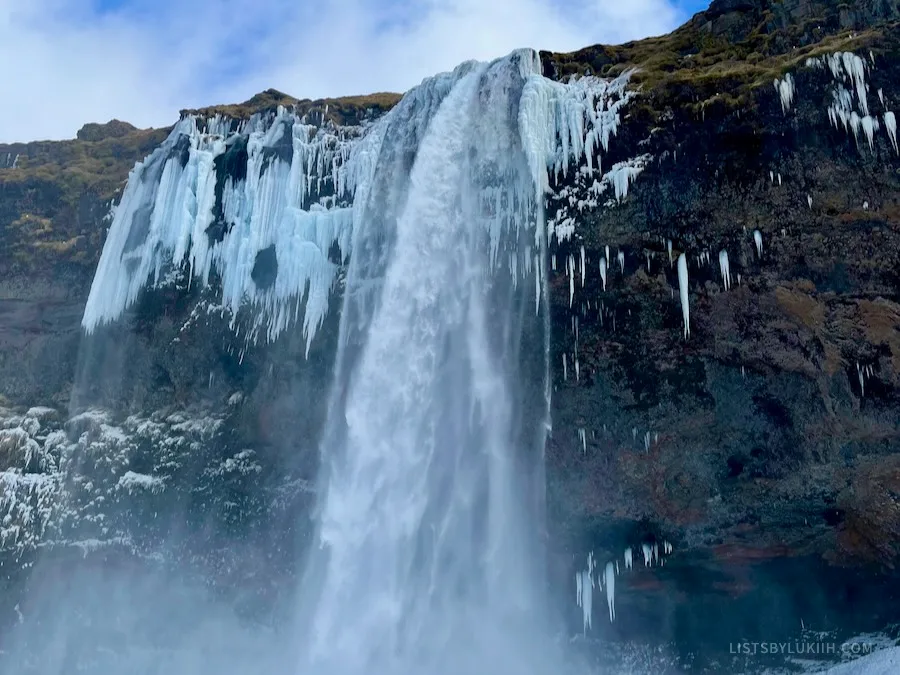
🍀 My Experience With Iceland’s Weather
I traveled to Iceland in August and was fortunate enough to experience great weather (sunny days with a little rain) six out of the seven days I was there.
Learn what Iceland is like in August.
Iceland’s weather conditions are volatile year-round and a popular saying is that you can experience all four seasons in one day there. You’ll likely avoid snow in the summer months, but you can still expect rain, hail, and high winds.
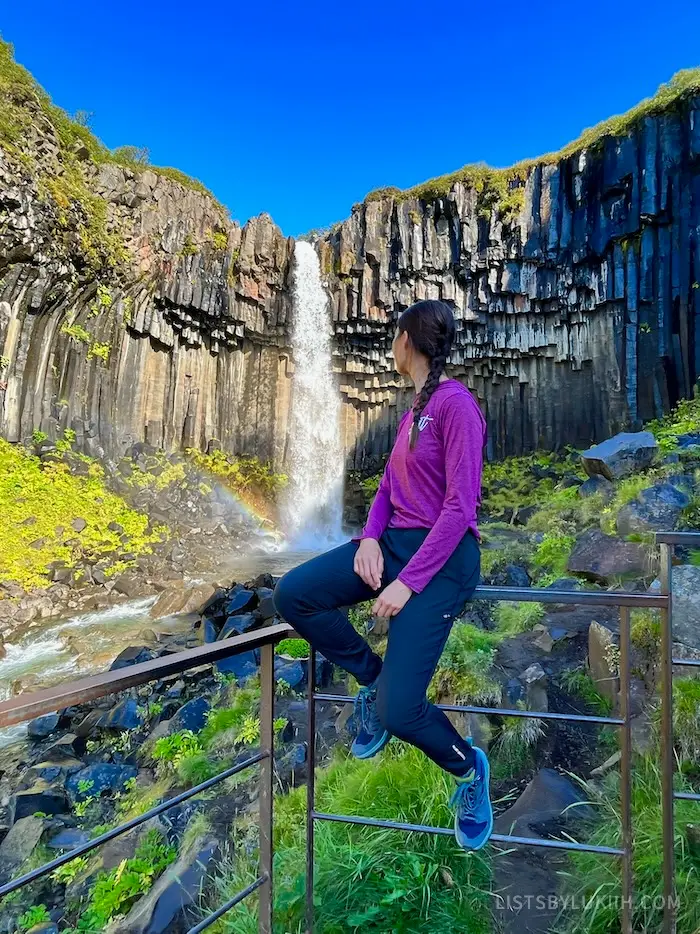
4. How To Get Around in Iceland
The best way to get around Iceland is by driving, but visitors also have other options that are less convenient.
✈️ Flying Into Iceland
Iceland’s main international airport, Keflavík International Airport (KEF), receives 99% of international flights.
The airport is located near the capital city, Reykjavík. From the airport, you can get around Iceland by driving, riding the bus, or relying on tour transportation.
🚗 Iceland’s Main Road: The Ring Road
Iceland is a relatively small European island country that has a main road, called the Ring Road, running around the entire country.
This is the primary road you’ll be traveling on to go from one natural attraction to the next. The Ring Road’s road conditions are well-maintained (e.g., well-paved, no potholes, clear signage, not too narrow).
Unless you’re solely relying on tour transportation, be prepared to spend a lot of time driving in Iceland. I clocked in more than 20 hours of driving during my one-week Iceland vacation.
🚙 Option 1: Car Rental
You can drive a rental car around Iceland’s Ring Road and book accommodations along the way. Your Iceland itinerary will determine what type of car to rent (e.g., sedan, SUV, 4x4s).
Here are some other tips to know when booking a car rental:
- You’ll also want to consider the type of insurance to get, as Iceland’s weather is notoriously volatile and it’s not uncommon for car doors to fly off in strong wind.
- If you’re off the Ring Road, you’ll sometimes have to drive through gravel roads and dirt paths.
- If you drive through Iceland’s Highlands, the sparsely-populated middle part of the country, you’ll need a 4×4. Rental companies do not allow driving on the Highlands with a regular car.
🚐 Option 2: Campervan Rental
With its well-maintained campsites, breathtaking scenery, and good road conditions, Iceland is a great place to visit in a campervan.
Having done it myself, I think exploring Iceland by campervan is the best way to travel around the country.
Learn how to travel around Iceland by campervan.
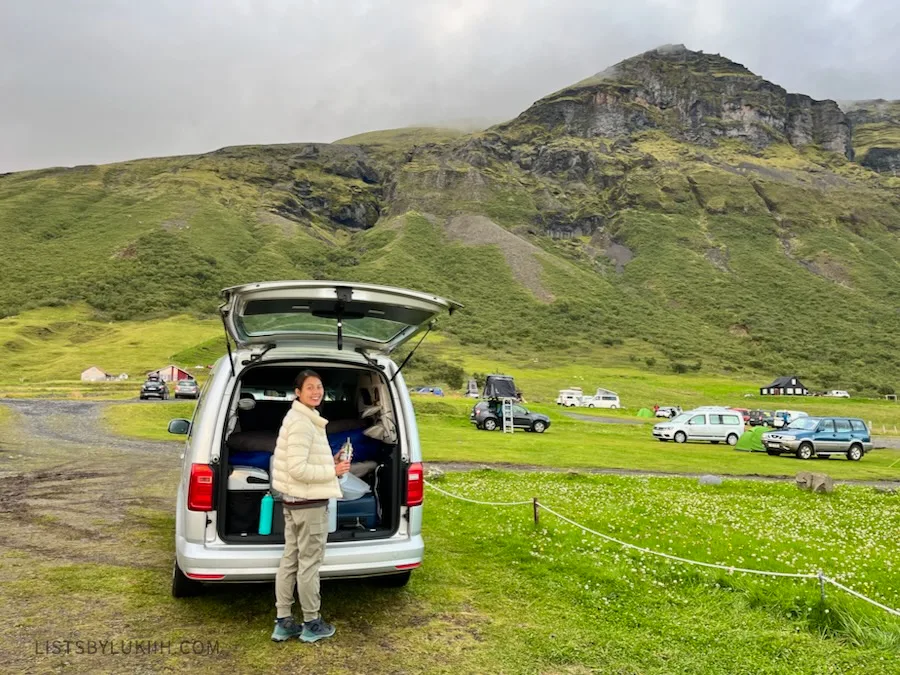
🚌 Option 3: Bus
Iceland doesn’t have any public transport that takes you around the entire island. But with some planning, you can travel around the Ring Road by bus.
🗺️ Option 4: Tour Transportations
Iceland runs several bus tours from main tourist areas like Reykjavík. This reduces how much you need to plan, but significantly increases transportation time (e.g., it takes four hours to get to the biggest glacier hike from Reykjavík).
Relying on tour transportation is the best option if you’re staying in Reykjavík and doing a quick trip to an attraction outside of the city.
🚲 Option 5: Cycling
If you’re adventurous and so inclined, you can bike the Ring Road and stay at campsites or other accommodations. Very few people do this, but I saw several cyclists during the summer months.
🍀 How I Got Around Iceland
Iceland is a perfect place to explore and drive yourself by campervan, which is what I did. This Iceland campervan guide shares tips on renting one, researching campsites, preparing meals, packing, and more.
Make sure you know Iceland’s unique driving rules (e.g., the Ring Road’s speed limit is only 55 miles per hour). The most common offense that tourists inherit in Iceland is traffic violations which can have expensive fines.
5. Entry Requirements for Iceland
The entry requirement for Iceland is straightforward for US citizens.
🛃 Iceland’s Visa and Passport Requirements
A tourist visa is not required for United States citizens visiting Iceland for up to 90 days.
Starting in 2025, United States travelers will need to meet a new travel authorization requirement called ETIAS to enter Iceland.
Also, your US passport must be valid for three months from the departure date of your Iceland trip so that you don’t have any issues getting in.
🍀 My Experience Entering Iceland
Being an American citizen comes with the privilege of holding one of the world’s most powerful passports, so I had no issues entering Iceland.
6. Budgeting and Cash in Iceland
Iceland is one of the most expensive tourist destinations in Europe.
💰 Expected Budget in Iceland
Here’s approximately how much you can expect to spend when visiting Iceland:
| Travel Style | Budget per Day |
|---|---|
| Budget Travelers | $80 |
| Mid-Range Budget Travelers | $200 |
Tipping is not customary, but it’s appreciated in Iceland.
🏧 Do You Need Cash In Iceland?
Iceland has a great credit card infrastructure, so credit cards are widely accepted and the main form of payment.
But you can bring a little bit of cash just in case you run into certain scenarios where cash is needed (e.g., when a card machine is down, for a very remote shop)
American Express is not as widely accepted as Mastercard or Visa in Iceland, so make sure it isn’t the only credit card you bring.
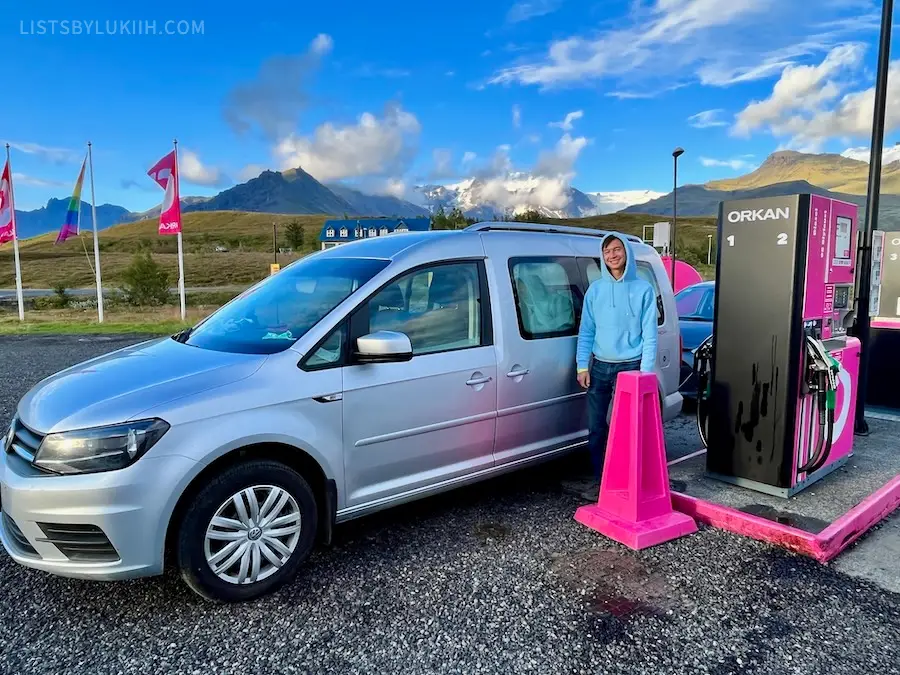
Gas station pumps in Iceland may not accept debit cards or credit cards. If this happens, go inside the gas station store and pay at the counter.
💵 Are US Dollars Accepted in Iceland?
Iceland’s local currency is the Icelandic Króna (ISK). The US dollar is not widely accepted, so make sure to exchange currencies.
The exchange rate was $1 USD = 138 ISK at the time of writing.
🍀 My Iceland Trip’s Budget
Iceland is the most expensive country I’ve traveled to. The glacier hike I did was over $200 for a half-day tour, making it the most expensive tour per hour I’ve ever done.
I share all my travel expenses in this Iceland budget breakdown.
7. How To Stay Safe in Iceland
Here are safety tips to keep in mind when traveling to Iceland.
⚠️ Is Iceland Safe to Visit?
Iceland is considered an extremely safe country to visit. Violence and even petty theft against tourists are very rare.
Iceland not only has a travel advisory level of 1 per the US Department of State, but it is also ranked #1 out of 163 safest countries by the Global Peace Index (for reference, the United States is ranked #131).
🚙 Common Scams in Iceland
Tourists are rarely scammed in Iceland, but there are a few tourist traps to watch out for:
- Iceland has one of the freshest and cleanest waters in the world. While places sell bottled water to tourists, don’t pay for something you can easily get for free.
- Getting some car insurance is a good idea in Iceland, but Theft Protection (TP) insurance is silly to get as it rarely happens in this low-crime country.
- Lopapeysa is an Icelandic woolen sweater, but not all sweaters are authentic and truly from Iceland. Shop at The Handknitting Association for authentic ones.
- 10-11 shops are the most expensive and touristy grocery stores in Iceland. Instead, shop at Kronan, Netto, and Bonus.
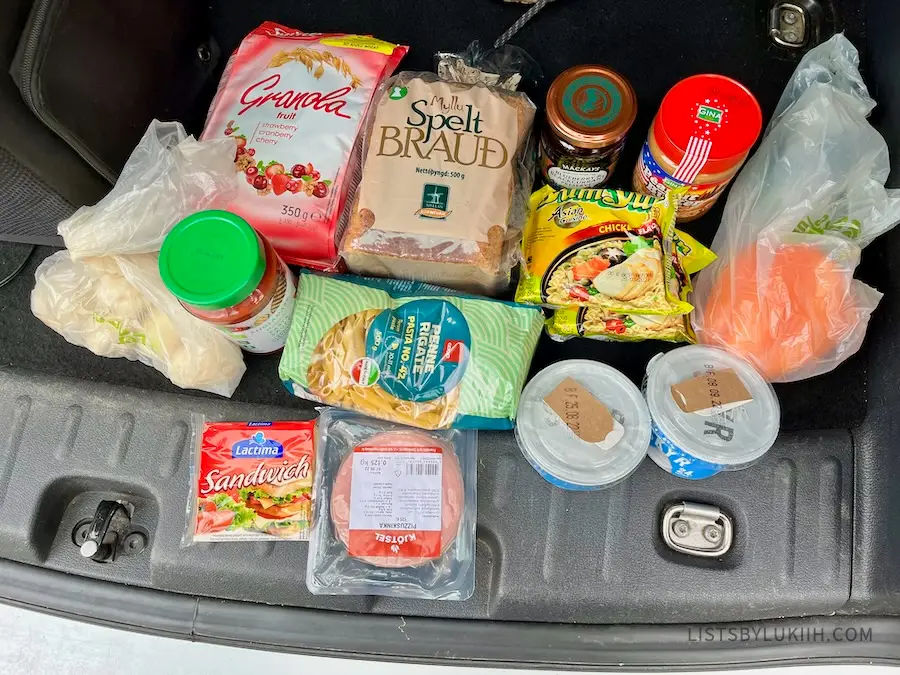
💧 Is Tap Water Safe To Drink in Iceland?
Iceland has one of the cleanest waters in the world, as it’s filtered by layers of lava and rocks for decades. I found Iceland’s tap water to be some of the freshest-tasting water I’ve ever drank.
I brought my reusable water bottle, which I refilled at restaurants and cafes with no issues. I even drank water from a glacier.
🦟 Does Iceland Have Mosquitoes?
Iceland is the only other country, besides Antarctica, that has no mosquitoes.
While Iceland doesn’t have any mosquitoes, it does have other flying bugs that are a nuisance, but at least they don’t bite.
🍀 My Safety Tips for Iceland
Iceland felt like one of the safest countries in the world. I saw very young kids walking around by themselves in a way I don’t see them doing in the United States, even in New York City where kids are known to be street-smart at an early age.
For all the reasons listed above, I don’t have any safety tips in Iceland except to make sure to check the weather and know the road rules if you plan to drive.
8. Language Barrier in Iceland
Iceland’s official language is Icelandic.
🗣️ Is English Common in Iceland?
Iceland is extremely English-friendly, as 98% of the population speaks English.
Despite the high rate of English speakers in Iceland, it’s nice to know a few basic Icelandic phrases. Here are some common Icelandic words and phrases to know:
🍀 Navigating Iceland With Just English
I had no trouble navigating Iceland as a native English speaker. I also found that most locals keep to themselves and are generally very polite, so there’s no pressure to interact if you don’t want to.
9. What To Pack for Iceland
No matter the time of year that you go to Iceland, remember that it has a cold climate.
🧳 Packing List for Iceland
Here are the essential items to pack and bring with you to Iceland:
- Layers. Since Iceland is a cold-temperature country where you can experience winter and summer weather within a day, it’s important to pack several layers of clothing.
- Rain jacket. Due to the volatile weather and the many powerful waterfalls, being waterproof is key in Iceland. I bought this rain jacket specifically for my Iceland trip and wore it every day. I also brought this rain poncho, which I wore on top of my rain jacket during strong rain.
- Waterproof shoes or hiking shoes. For the same reason as above, make sure to wear waterproof shoes.
- Reusable water bottle. There’s no need to buy bottled water in Iceland as it has one of the cleanest waters in the world. I brought my insulated, reusable water bottle everywhere.
- Bathing suits. Don’t forget to bring a bathing suit for the natural hot springs (Iceland has over 40 of them).
- Waterproof phone case. You’ll want a phone case for the rain and hot springs. I brought this waterproof phone case to all the hot springs I visited.
If you’re traveling around Iceland by campervan like I did, my comprehensive packing list is in this campervan guide.
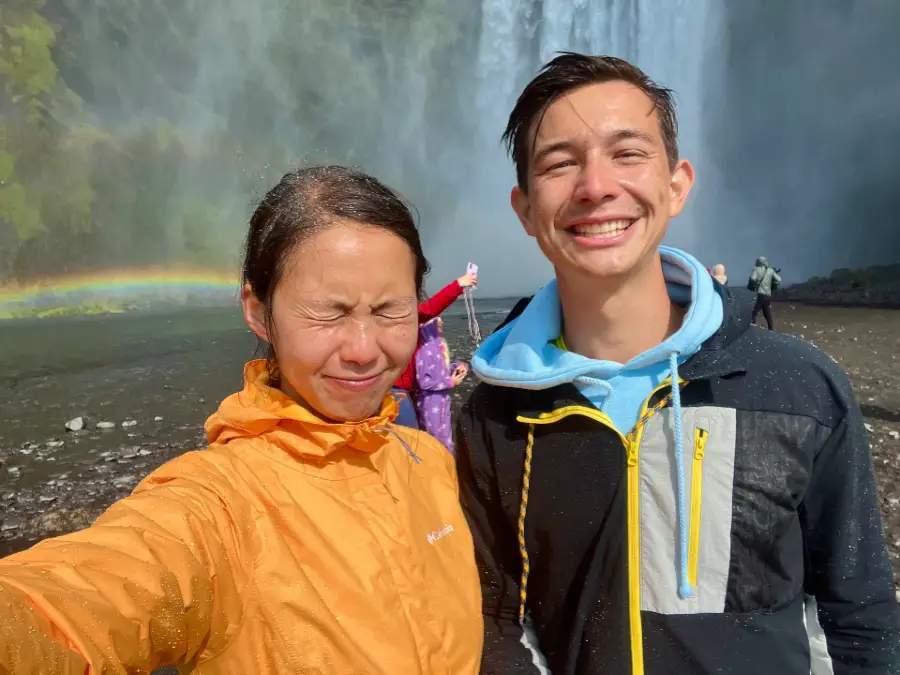
10. Accommodation Tips in Iceland
Iceland’s accommodations can be hard to come by during the peak season, so you may want to consider several options.
💡 Pro Tip: Book Accommodations Ahead
Iceland gets about seven times more visitors than its local population. Accommodations can run out quickly during the summer season.
When you’re traveling to Iceland during the peak season, make sure to book accommodations three to four months in advance, or you may not be left with many or any options.
🏠 Types of Accommodations in Iceland
Here’s a quick overview of the types of accommodations you’ll find in Iceland:
- Hotels and Airbnbs are available in Iceland, but smaller towns will have limited options. I generally like to use Booking.com for the lowest accommodation rates, especially in a country as expensive as Iceland.
- Guest houses are family-run establishments in Iceland that offer a more cozy experience.
- Hostels are also available for budget travelers. Hostels in Iceland tend to be clean and well-maintained.
- Farm stays provide a unique opportunity to experience rural life in Iceland and can vary in terms of what’s provided (e.g., private rooms vs. public rooms).
- Campsites are well-maintained in Iceland. They are the legal places to sleep in Iceland if you’re traveling by campervan (it’s illegal to park and sleep just anywhere). Note that campsites’ facilities vary and not all of them are open during the winter months.
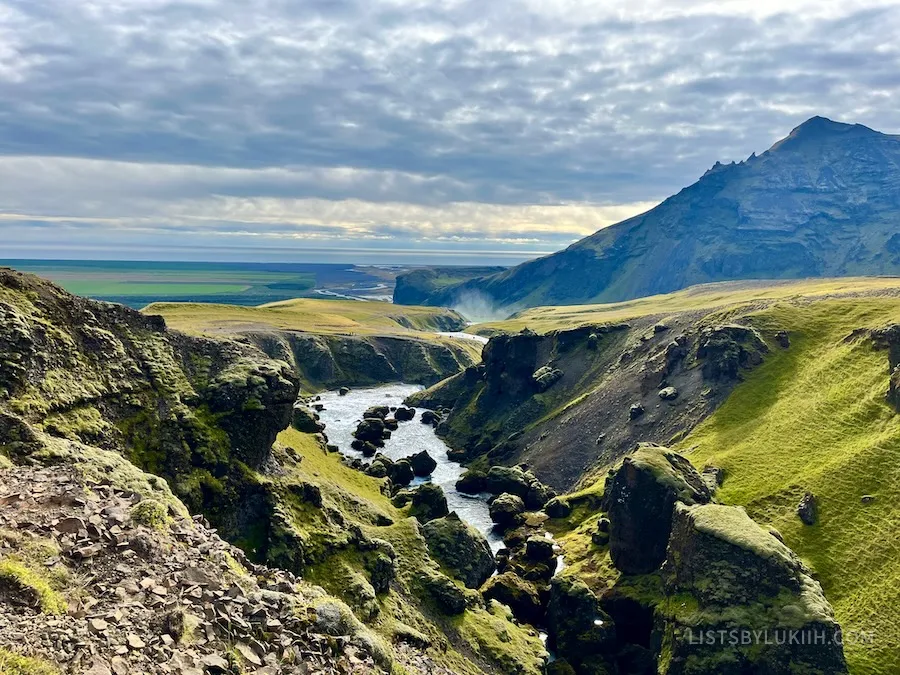
11. Dining Out Tips in Iceland
Iceland food can be expensive and unique, so be prepared to try new things.
🌭 Tips When Eating in Iceland
Here are some firsthand tips on eating in Iceland:
- Tip #1: Eating at an Iceland gas station is nice and affordable. Unlike the gas stations in the United States, gas stations in Iceland are decent and clean places to have a meal.
- Tip #2: Shop at grocery stores in Iceland if you want to save some money. Look for grocery shops like Bonus (budget), Kronar (wider selections), and Netto (fewer selections). Avoid 10-11 as they’re more expensive and target tourists.
- Tip #3: Bakeries and cafes in Iceland are affordable options. Many small towns in Iceland have a bakery or cafe with fresh pastries and coffee.
- Tip #4: Some areas don’t have many restaurant options. Iceland receives a high number of tourists for how many locals they have, so popular restaurants get filled up during the peak season. Make sure to book reservations at these restaurants.
🍀 My Iceland Dining Experience
I found the hot dogs at the Iceland gas station surprisingly yummy and affordable and ate them a few times. I also enjoyed the amazing cinnamon buns at Braud & Co in Reykjavík. I tried the Icelandic delicacy, hákarl (fermented shark), and didn’t find it as gross as others seem to.
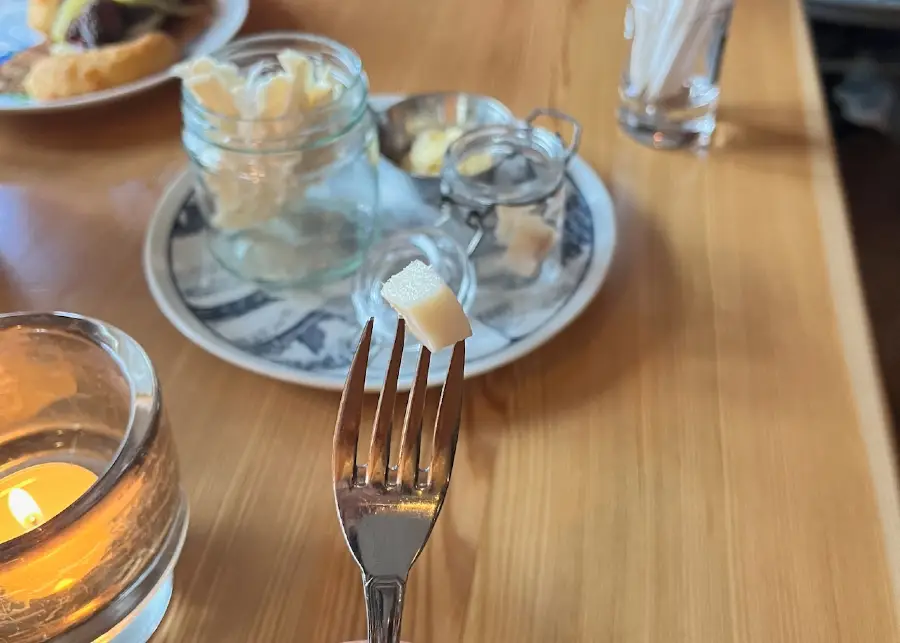
Iceland Trip Planner 2026
Make planning easier with my flexible, research-backed travel planner—shaped by real experience. It has:
- 2026 travel info
- Curated itinerary
- Practical insights & tips
- Simple budget tracker
- Destination-specific packing list
- Fully customizable sections
Built in Notion, this is the tool I personally use to plan every trip. I genuinely love it and creating a Notion account is free.
Lists by Lukiih is a small site I fund myself. Downloading my trip planner is the best way to support me and keep it running—thanks!
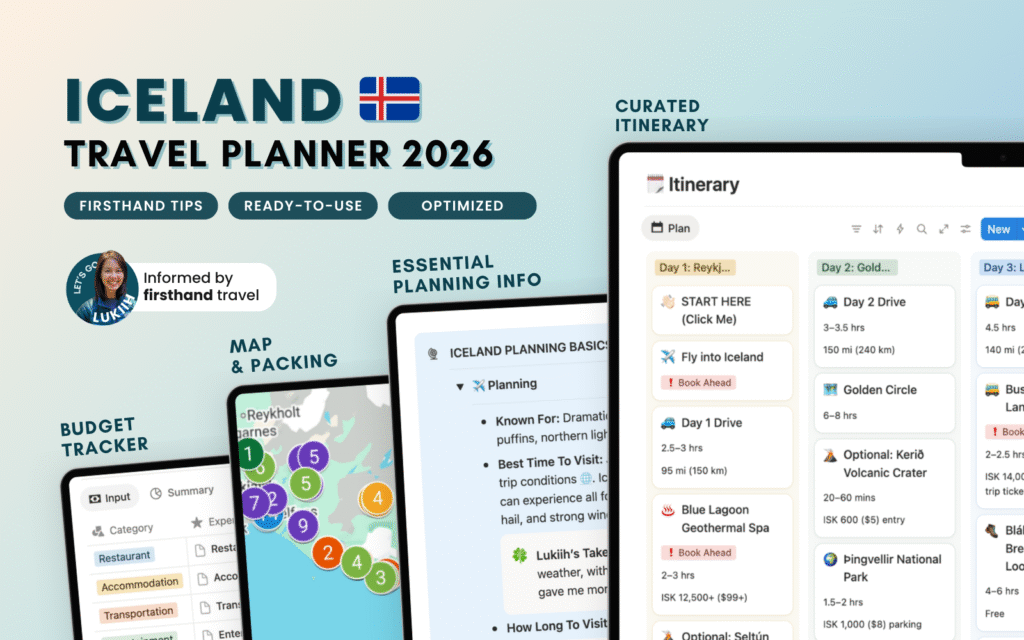
Iceland Travel Guides
- 🇮🇸 Planning a Trip to Iceland: 11 Practical Things To Know
- 🚙 Iceland South Coast: Efficient 7-Day Road Trip Itinerary
- 🚐 My Iceland Campervan Trip: How To Plan One + Tips
- 💰 My Iceland Trip Cost: My Budget Breakdown (2025)
- 🧊 Hiking a Glacier in Iceland: My Honest Review & Tips
- ♨️ Hrunalaug Hot Spring: My Honest Review & Tips
- ☀️ Visiting Iceland in August: Tips & What To Know
